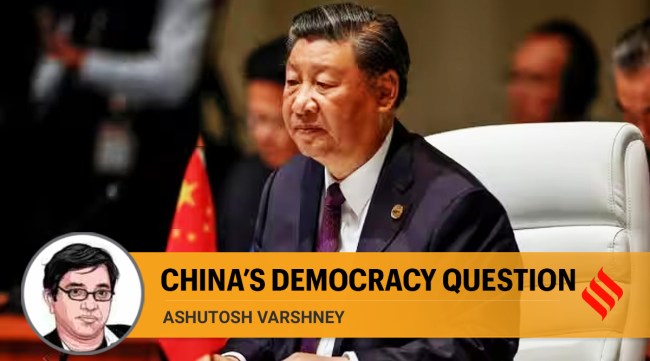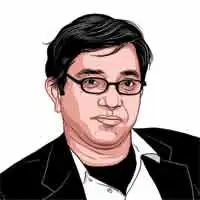Opinion Ashutosh Varshney writes: In China, the challenge of democracy without elections
The Communist Party does not accept any challenges to its monopoly over power. A way out is to intellectually formulate a non-electoral conception of democracy and propagate it to the world. But that comes with its own challenges
 Even under Xi, China uses the term “socialist democracy” to describe what the polity and society are all about. (Reuters)
Even under Xi, China uses the term “socialist democracy” to describe what the polity and society are all about. (Reuters) Is there a non-electoral way of conceptualising democracy? This question featured prominently in a conference I recently attended at Zhejiang University in China. The university is situated in Hangzhou, about 175 kilometres south of Shanghai, a distance commutable via road in a mere two and a half hours and via high-speed train in 45-50 minutes. In international business circles today, Hangzhou is known as the city of Jack Ma, one of Asia’s richest, who in 1999 headquartered his Alibaba Group there.
Inside China, the city is well-known as a cultural and intellectual capital. It is also the site of the famous West Lake, where even Mao Zedong would take a rest. A plaque in one of the villas commemorates Mao’s stay in the spring of 1957, when he tried to learn English. The university also has great national significance. Reflecting in part how much the Chinese government is investing in science, as China rises, Zhejiang University, as a physics professor told me, has 150 physicists. Some other universities such as Tsinghua in Beijing, he added, have even bigger constellations of physicists. In comparison, it should be noted that MIT, a legendary American university for science and engineering, has only 120 physicists.
But I was not there for an appreciation of Chinese science. I was participating in a conference on modernisation and political development. That is why the question of whether democracy can be conceptualised in a non-electoral way played an important role. It seemed as though China’s political scientists were feeling considerable angst about this question. Partly, the cause appears to be the great, though undiscussed, authoritarian turn in China over the last decade. But an underlying issue, noticeable even earlier, is quite clear.
Over a century and a half after the defeat in the Second Opium War (1856-60) and more than a century after losing to Japan (1894-5), including surrendering Taiwan to Japanese control (1895-1945), what does China’s re-emergence as a great power signify? In particular, how does the world look at China? China may have become a mighty power again, but it is also evident to Chinese intellectuals that the highest international respect still goes to countries that are not only rich and powerful but also democratic. A hugely wealthy Saudi Arabia is accommodated, but not respected.
Democracy has become a great currency of international respect in modern times. That is why “dictatorship of the proletariat”, a celebratory Marxist concept of the past, has disappeared from the leftist political lexicon. Even under Xi, China uses the term “socialist democracy” to describe what the polity and society are all about. Though sometimes challenged, the legitimacy of democracy as one of the highest political ideals has not been undermined.
But beyond the local level where elections have taken place, the chances that China will have elections to determine who should rule in Beijing or the provincial capitals are virtually non-existent in the foreseeable future. The Communist party does not accept any challenges to its monopoly over power — not from students as the crushing of protests showed in 1989, nor from businessmen as the clipping of Jack Ma’s wings demonstrated in 2020, nor even from highly placed Communist party leaders as repeated purges have shown, though the last kind of revolt is typically a challenge to Communist leadership, not to the Communist monopoly over power.
This also has implications for protests, normally viewed as central to democracies. As Kevin O’Brien and Lianjiang Li famously argued in Rightful Resistance in Rural China, protests in China typically succeed when protesting citizens frame their demands in such a manner that the Communist monopoly over national power is not questioned, but the behaviour of local officials is criticised for not living up to party ideals. Betrayal of Communist ideas and Communist elites by lower-level officials is the way to frame a successful protest. Such framing ends up strengthening the Communist monopoly over power; it does not weaken it.
Clearly, a way out is to intellectually formulate a non-electoral conception of democracy and propagate it to the world. In principle, an alternative is available. Other than Karl Marx, Jean-Jacques Rousseau, a great political theorist of the modern era, was an important voice against free elections.
In The Social Contract, Rousseau said the following about England’s democracy: “The people of England regards itself as free; but it is grossly mistaken; it is free only during the election of members of parliament. As soon as they are elected, slavery overtakes it, and it is nothing.” Instead of elections, Rousseau preferred regular citizen participation in decision-making and, that too, in small-scale polities. He even believed Poland was too big, and needed to be broken down into smaller units to facilitate citizen participation.
But the idea of participation is simply a starting point. Even if we accept it as defining democracy, we will have to devise institutions that will make sure that such participation is free, not fear-induced. Can such participation, however, be free and meaningful, if we only have one party encouraging it, if we don’t have multiple organisations fearlessly presenting their views about what ought to be done and protecting citizens who disagree with the official view, if we don’t have a free press or watchdog groups monitoring the participation? Without institutional details, the idea of participation is simply a beginning, not an end. China’s social scientists, interested in a Rousseauvian concept of democracy, have an intellectual challenge ahead.
This column would be incomplete if it did not go beyond politics. Over the last decade, I have been in China four times, though Covid produced a long hiatus before this visit. Unlike earlier, China’s economic deceleration is now a much-talked-about phenomenon. But I detected no signs of it in Shanghai’s People’s Square or Hangzhou’s main thoroughfares.
They were buzzing as usual. I also met more Indian businessmen than before. They were looking for deals in the green energy or electric vehicle parts sectors. Perhaps the economic downturn will come to the principal sites of economic dynamism last, or perhaps the deceleration will be reversed over time. But what is true is that at no time did I see fewer Western visitors in Shanghai, a city bustling with them on earlier visits. Is that a sign that the geopolitical tensions are beginning to have an economic fallout?
The writer is Sol Goldman Professor of International Studies and the Social Sciences at Brown University, where he also directs the Saxena Center for Contemporary South Asia at the Watson Institute






